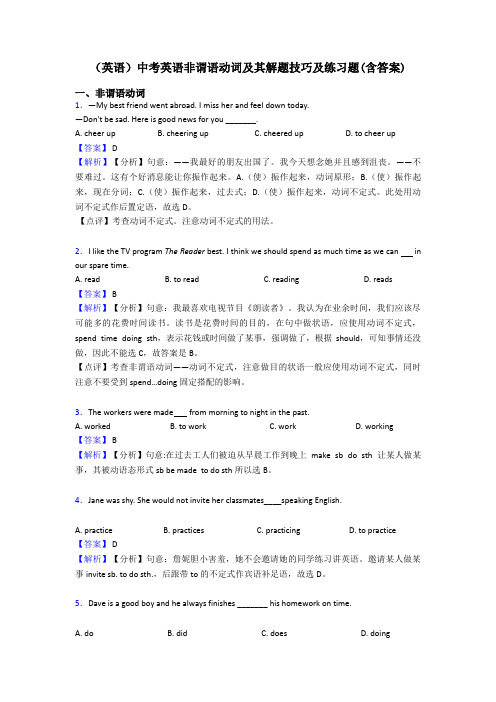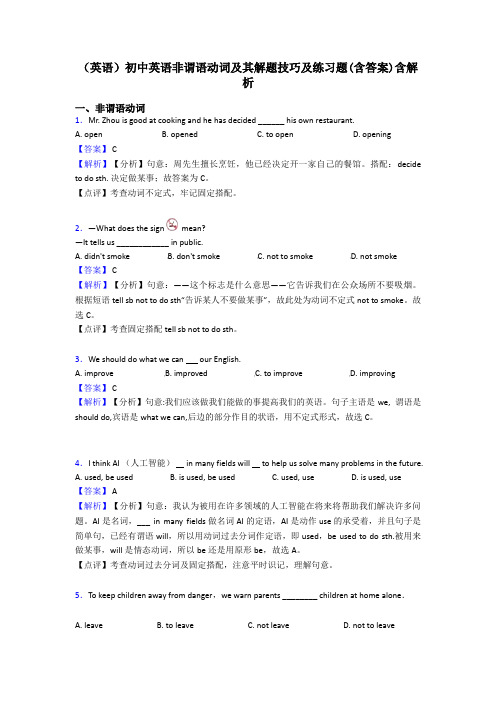(英语)初中英语非谓语动词解题技巧讲解及练习题(含答案)
- 格式:doc
- 大小:77.00 KB
- 文档页数:7

(英语)初中英语非谓语动词的技巧及练习题及练习题(含答案)含解析一、非谓语动词1.Would you mind _____ care of my pet fish while I'm away on holiday?A. takeB. takenC. to takeD. taking【答案】 D【解析】【分析】句意:当我度假离开的时候,你介意照看我的宠物鱼吗?mind doing sth.,介意做某事,应使用动名词形式,故答案是D。
【点评】考查从名词,注意识记固定搭配mind doing的用法。
2.—Have you ever heard that China is building a nationwide 5G network?—Right. 5G will allow us ________ English movies faster than ever.A. downloadB. downloadsC. to downloadD. downloading【答案】 C【解析】【分析】句意——你听说了中国正在建造全国5G网络吗?——对,5G将会让我们比原来更快的速度下载英文电影。
allow sb to do sth,允许某人做某事,固定短语,应使用动词不定式,故答案是C。
【点评】考查动词不定式,注意识记固定搭配allow sb. to do sth结构。
3.Jane was shy. She would not invite her classmates____speaking English.A. practiceB. practicesC. practicingD. to practice【答案】 D【解析】【分析】句意:詹妮胆小害羞,她不会邀请她的同学练习讲英语。
邀请某人做某事invite sb. to do sth.,后跟带to的不定式作宾语补足语,故选D。
4.Smart phones ______ by Huawei are getting more and more popular around the world.A. madeB. makingC. to make【答案】 A【解析】【分析】句意:由华为制造的智能手机在全世界正在变得越来越受欢迎。

(英语)中考英语非谓语动词及其解题技巧及练习题(含答案)一、非谓语动词1.—My best friend went abroad. I miss her and feel down today.—Don't be sad. Here is good news for you _______.A. cheer upB. cheering upC. cheered upD. to cheer up【答案】 D【解析】【分析】句意:——我最好的朋友出国了。
我今天想念她并且感到沮丧。
——不要难过。
这有个好消息能让你振作起来。
A.(使)振作起来,动词原形;B.(使)振作起来,现在分词;C.(使)振作起来,过去式;D.(使)振作起来,动词不定式。
此处用动词不定式作后置定语,故选D。
【点评】考查动词不定式。
注意动词不定式的用法。
2.I like the TV program The Reader best. I think we should spend as much time as we can in our spare time.A. readB. to readC. readingD. reads【答案】 B【解析】【分析】句意:我最喜欢电视节目《朗读者》。
我认为在业余时间,我们应该尽可能多的花费时间读书。
读书是花费时间的目的,在句中做状语,应使用动词不定式,spend time doing sth,表示花钱或时间做了某事,强调做了,根据should,可知事情还没做,因此不能选C,故答案是B。
【点评】考查非谓语动词——动词不定式,注意做目的状语一般应使用动词不定式,同时注意不要受到spend…doing固定搭配的影响。
3.The workers were made from morning to night in the past.A. workedB. to workC. workD. working【答案】 B【解析】【分析】句意:在过去工人们被迫从早晨工作到晚上make sb do sth让某人做某事,其被动语态形式sb be made to do sth所以选B。

(英语)初中英语非谓语动词解题技巧及练习题及解析一、非谓语动词1.He took off his expensive watch ____ the fact that he was rich.A. to hideB. hidC. hideD. hidden【答案】 A【解析】【分析】句意:他摘下昂贵的手表以掩盖自己富有的事实。
分析题干可知,摘下贵重的手表的目的是为了掩盖有钱的事实,因此用动词不定式做目的状语,故选A。
【点评】考查动词不定式的基本用法。
注意在句中做目的状语。
2.We advise parents _____ their children at home alone in order to keep them away from danger.A. not leaveB. not to leaveC. leaveD. to leave【答案】 B【解析】【分析】句意:为了使孩子远离危险,我们建议父母不要单独把孩子留在家里。
advise sb to do sth建议某人做某事,动词不定式的否定形式就是在to前面加not故advise sb not to do sth建议某人不要做某事。
结合句意,故选B3.To my surprise, Daniel's parents allowed him ___________ Shanghai Disneyland with me.A. to visitB. visitingC. visitD. visits【答案】 A【解析】【分析】句意:让我吃惊的的,戴尔的父母允许他和我去上海迪士尼乐园。
allow sb. to do sth.允许某人做某事,固定短语,故选A。
【点评】此题考查动词不定式。
注意固定短语allow sb. to do sth。
4.—What does the sign mean?—It tells us ____________ in public.A. didn't smokeB. don't smokeC. not to smokeD. not smoke【答案】 C【解析】【分析】句意:——这个标志是什么意思——它告诉我们在公众场所不要吸烟。

(英语)初中英语非谓语动词及其解题技巧及练习题(含答案)含解析一、非谓语动词1.Mr. Zhou is good at cooking and he has decided ______ his own restaurant.A. openB. openedC. to openD. opening【答案】 C【解析】【分析】句意:周先生擅长烹饪,他已经决定开一家自己的餐馆。
搭配:decideto do sth. 决定做某事;故答案为C。
【点评】考查动词不定式,牢记固定搭配。
2.—What does the sign mean?—It tells us ____________ in public.A. didn't smokeB. don't smokeC. not to smokeD. not smoke【答案】 C【解析】【分析】句意:——这个标志是什么意思——它告诉我们在公众场所不要吸烟。
根据短语tell sb not to do sth“告诉某人不要做某事”,故此处为动词不定式not to smoke。
故选C。
【点评】考查固定搭配tell sb not to do sth。
3.We should do what we can our English.A. improveB. improvedC. to improveD. improving【答案】 C【解析】【分析】句意:我们应该做我们能做的事提高我们的英语。
句子主语是we, 谓语是should do,宾语是what we can,后边的部分作目的状语,用不定式形式,故选C。
4.I think AI (人工智能) in many fields will to help us solve many problems in the future.A. used, be usedB. is used, be usedC. used, useD. is used, use【答案】 A【解析】【分析】句意:我认为被用在许多领域的人工智能在将来将帮助我们解决许多问题。

【英语】中考英语非谓语动词解题技巧及练习题(含答案)一、非谓语动词1.Mr. Zhou is good at cooking and he has decided ______ his own restaurant.A. openB. openedC. to openD. opening【答案】 C【解析】【分析】句意:周先生擅长烹饪,他已经决定开一家自己的餐馆。
搭配:decide to do sth. 决定做某事;故答案为C。
【点评】考查动词不定式,牢记固定搭配。
2.When you leave, please turn off the lights energy.A. saveB. to saveC. savingD. saved【答案】 B【解析】【分析】句意:当你离开时请关灯以节约能源。
动词不定式表示目的,结合句意,故选B。
3.My brother is a humorous young man. He often tells jokes to make us .A. laughingB. laughC. to laugh【答案】 B【解析】【分析】句意:我哥哥是应该幽默的年轻人,他经常讲笑话让我们笑。
make sb do sth ,使某人做某事,省略to的动词不定式,应该是动词原形,故选B。
【点评】考查省略to的动词不定式。
make sb do sth ,使某人做某事。
4.The show was so funny that it made everyone ______ again and again.A. laughB. laughedC. laughingD. to laugh【答案】 A【解析】【分析】考查非谓语动词。
句意:这节目太好笑了,它使每个人都连连大笑。
make sb do sth让某人做某事。
所以选A。
5.—Is this dictionary Ming's?—Yes. Please remember it to him when you finish the words.A. to return; to look upB. to return; looking upC. returning; to look upD. returning; looking up【答案】 B【解析】【分析】句意:一这本字典是明的吗?一是的,请记当你查阅完这些单词把字典还给他。

英语非谓语动词解题技巧讲解及练习题(含答案)及解析一、非谓语动词1.—Do you always get up so early?—Yes, ________ the first bus. My home is far away from school.A. catchB. to catchC. catchingD. caught【答案】 B【解析】【分析】句意:——你总是起床这么早吗?——是的,为了赶上早班车。
我家离学校很远。
根据 My home is far away from school. 可知起床早是为了赶汽车,是动词不定式表示目的,故选B。
【点评】考查动词不定式。
动词不定式放在句首做目的状语。
2.My parents didn't allow me ______ to the party.A. goB. to goC. goesD. went【答案】 B【解析】【分析】:本题考点为非谓语动词(固定用法)。
allow sb. to do sth.,即“允许某人做某事”。
故答案为B。
3.My brother is a humorous young man. He often tells jokes to make us .A. laughingB. laughC. to laugh【答案】 B【解析】【分析】句意:我哥哥是应该幽默的年轻人,他经常讲笑话让我们笑。
make sb do sth ,使某人做某事,省略to的动词不定式,应该是动词原形,故选B。
【点评】考查省略to的动词不定式。
make sb do sth ,使某人做某事。
4.—What does the sign mean?—It tells us ____________ in public.A. didn't smokeB. don't smokeC. not to smokeD. not smoke【答案】 C【解析】【分析】句意:——这个标志是什么意思——它告诉我们在公众场所不要吸烟。
【英语】初中英语非谓语动词解题技巧和训练方法及练习题(含答案)含解析一、非谓语动词1.My little brother didn't go to bed until he finished his homework last night.A. doB. doingC. to do【答案】B【解析】【分析】句意:昨天晚上我弟弟直到完成作业才睡觉。
finish doing sth完成做某事,故答案为B。
【点评】考查动名词的用法,掌握固定搭配。
2.We advise parents _____ their children at home alone in order to keep them away from danger.A. not leaveB. not to leaveC. leaveD. to leave【答案】 B【解析】【分析】句意:为了使孩子远离危险,我们建议父母不要单独把孩子留在家里。
advise sb to do sth建议某人做某事,动词不定式的否定形式就是在to前面加not故advisesb not to do sth建议某人不要做某事。
结合句意,故选B3.My friend invited me ______ the Art Club , and I accepted it with pleasure.A. joinB. to joinC. joinedD. joining【答案】 B【解析】【分析】句意:我的朋友邀请我参加艺术俱乐部,我愉快地接受了。
A.动词原形;B.动词不定式;C. 动词过去式;D.动词的ing形式。
invite sb. to do sth.邀请某人做某事。
结合句意及结构,故选B。
4.I think AI (人工智能) in many fields will to help us solve many problems in the future.A. used, be usedB. is used, be usedC. used, useD. is used, use【答案】 A【解析】【分析】句意:我认为被用在许多领域的人工智能在将来将帮助我们解决许多问题。
非谓语动词非谓语动词是英语语法中的一个重要概念,指的是在句子中不能单独作谓语,但又具有动词特征的动词形式。
一、种类非谓语动词主要包括三种形式:不定式(Infinitive)、动名词(Gerund)和分词(Participle)。
1.不定式基本形式是“to + 动词原形”(有时可省略to),例如“to study”、“to play”等。
它具有名词、形容词和副词的特征,可在句中充当主语、宾语、表语、定语、状语和补足语等成分。
To see is to believe.(作主语和表语)I want to learn English.(作宾语)2.动名词形式上是动词原形加-ing,和现在分词的形式一样,如“swimming”、“reading”等。
动名词在句中主要起名词的作用,可充当主语、宾语、表语和定语。
Swimming is my favorite sport.(作主语)I enjoy reading books.(作宾语)3.分词现在分词:也是动词原形加-ing,它既有动词特征,又有形容词和副词特征,可作定语、状语、表语和补足语。
The running boy is my brother.(作定语)Hearing the news, she couldn’t help crying.(作状语)过去分词:通常是动词原形加-ed(规则变化)或有其特殊的不规则变化形式,如“broken”、“written”等。
过去分词常表示被动或完成的意义,同样能充当定语、状语、表语和补足语等成分。
The broken cup is on the table.(作定语)Given more time, I can do it better.(作状语)二、用法区别1.作主语时不定式作主语常表示具体的某一次动作或行为,常用“It + be + 形容词+ (for/of sb.) + to do sth.”这样的结构,It is important for us to learn English well.动名词作主语往往表示抽象的、一般性的行为或概念。
英语非谓语动词常见题型及答题技巧及练习题(含答案)及解析一、非谓语动词1.My mother doesn't allow me _______outside too late on school nights.A. to stayB. stayC. staying【答案】 A【解析】【分析】句意:在上学的日子里,我妈妈不允许我在外面待得太晚。
Allow sb to do sth允许某人做某事,是固定用法,故答案选A。
【点评】考查动词不定式,掌握固定搭配。
2.—Jack hasn't taken his piano lessons for a long time.—He is considering _________ his piano course and spending more time on his study.A. to dropB. to throwC. droppingD. throwing【答案】 C【解析】【分析】句意:——Jack很久没有上钢琴课了。
——他在考虑放弃钢琴课,把更多的时间花在学习上。
consider doing sth考虑做某事。
drop放弃;丢掉;throw扔掉。
故选C。
【点评】考查动名词和动词辨析。
3.My brother is a humorous young man. He often tells jokes to make us .A. laughingB. laughC. to laugh【答案】 B【解析】【分析】句意:我哥哥是应该幽默的年轻人,他经常讲笑话让我们笑。
make sb do sth ,使某人做某事,省略to的动词不定式,应该是动词原形,故选B。
【点评】考查省略to的动词不定式。
make sb do sth ,使某人做某事。
4.—So beautiful flowers! I can't decide _____ for my mom.—For Mother's Day, it can't be better to take some carnations(康乃馨).A. when to chooseB. which to chooseC. how to choose【答案】 B【解析】【分析】句意:——如此漂亮的花。
初中英语非谓语动词解题技巧及经典题型及练习题(含答案)含解析一、非谓语动词1.I got up early this morning my grandma at the airport.A. to pick upB. picking upC. picked up【答案】 A【解析】【分析】我今天早上早早起床,为了在机场接我的奶奶。
短语pick up表示接某人,用动词不定式to do表示目的。
根据题意,故选A。
【点评】考查动词不定式。
掌握动词不定式做目的状语的用法。
2.Our English teacher wants us ______ English stories out of class.A. readB. readingC. to read【答案】 C【解析】【分析】考查非谓语动词。
want sb. to do sth.想要某人做某事。
故选C。
3.We are looking forward to _______ Hollywood in America。
()A. visitB. visitedC. visiting【答案】 C【解析】【分析】句意:我们期待看参观美国好莱乌。
期待(盼望)做某事:look forward to,短语中的加是介词(不是不定式符号),后跟名词、代词或动名词形式。
即:look forward sth/ doing sth。
故选C。
4. Though he often made his little sister ______, today he was made ______ by his little sister.A. cry; to cryB. crying; cryingC. cry; cryD. to cry; cry【答案】 A【解析】【分析】句意:虽然他经常使他的妹妹哭,但是今天他妹妹使他哭了。
使某人做某事: make sb do sth.后跟省to的不定式作宾语补足语,即前句填:cry,主动语态中省to的不定式,变为被动语态时,要用带to的不定式. 即后句填:to cry. 故选A。
(英语)初中英语非谓语动词解题技巧讲解及练习题(含答案)一、非谓语动词1.—Hello, Lucy, please give me some ____ on how to improve my English!—You'd better keep ___ more English books.A. advices; readB. advice; readC. advice; readingD. advices; reading【答案】 C【解析】【分析】句意:——你好,露西,关于如何提高我的英语请给我一些建议,——你最好坚持读英语书。
advice是不可数名词,没有复数形式;keep doing sth,坚持做某事,故选C。
【点评】考查固定搭配,注意keep doing sth的用法。
2.一What should we take when going birdwatching? 一 We should take a pair of binoculars ____________the birds clearly.A. seeB. seeingC. to seeD. sees【答案】C【解析】【分析】句意:一去看鸟应该带什么?一为了看得清楚,我们应该带一副望远镜。
带上望远镜的目的是看得清楚,用带to的不定式作目的状语。
故选C。
3. Though he often made his little sister ______, today he was made ______ by his little sister.A. cry; to cryB. crying; cryingC. cry; cryD. to cry; cry【答案】 A【解析】【分析】句意:虽然他经常使他的妹妹哭,但是今天他妹妹使他哭了。
使某人做某事: make sb do sth.后跟省to的不定式作宾语补足语,即前句填:cry,主动语态中省to的不定式,变为被动语态时,要用带to的不定式. 即后句填:to cry. 故选A。
4.The show was so funny that it made everyone ______ again and again.A. laughB. laughedC. laughingD. to laugh【答案】 A【解析】【分析】考查非谓语动词。
句意:这节目太好笑了,它使每个人都连连大笑。
make sb do sth让某人做某事。
所以选A。
5.I really don't know this question. It is too hard.A. which to answerB. how to answerC. what to answer【答案】 B【解析】【分析】句意:我真的不知道如何回答这个问题。
它太难了。
which to answer回答哪一个; how to answer怎么回答;what to answer回答什么;据It's too hard.可知此处指的是这个问题太难,不知道如何回答,选B6.The WWF is working hard _________ the animals in danger.A. saveB. to saveC. savesD. saved【答案】 B【解析】【分析】句意:世界自然基金会正努力工作来拯救处于危险中的动物。
此处表示目的,应该用动词不定式。
故选B。
【点评】考查动词不定式。
动词不定式表示目的。
7.As we all know, a person learns many things by making mistakes and ________ them.A. correctsB. correctC. to correctD. correcting【答案】 D【解析】【分析】句意:正如我们所知,一个人通过犯错误和纠正错误中,能学会很多东西。
and,表并列的连词,前后动词用法应该一致,根据making,可知此处用动词ing形式,因此用correcting,故选D。
【点评】考查固定搭配。
注意介词后接动词的ing形式。
8.As a volunteer,the girl wants to visit sick kids in the hospital them up.()A. to cheerB. cheerC. cheeringD. cheered【答案】 A【解析】【分析】作为一名志愿者,这个女孩想去看望医院里生病的孩子使他们振作起来.根据句意可知这个女孩想去看望医院里生病的孩子的目的是使他们振作起来,故该空处填入动词不定式作目的状语,故填to cheer,故选A9.My little brother didn't go to bed until he finished his homework last night.A. doB. doingC. to do【答案】B【解析】【分析】句意:昨天晚上我弟弟直到完成作业才睡觉。
finish doing sth完成做某事,故答案为B。
【点评】考查动名词的用法,掌握固定搭配。
10.—You'd better advise him ______ anything out of the window while driving.—I will. He has to know it's dangerous.A. not throwingB. no throwingC. not to throwD. don't throw【答案】C【解析】【分析】句意:——你最好劝他开车时不要向车窗外乱扔东西。
——我会的。
他必须知道这很危险。
advise,建议、劝告,固定搭配advise sb. not to do sth.劝告某人不要做某事。
故选C。
【点评】考查固定搭配advise sb. not to do sth.。
11.—You can only keep the books for two weeks, Tom. Remember ____them on time.—I will.A. returnB. returningC. to return【答案】 C【解析】【分析】句意:—这些书你能借两周,汤姆,记住按时归还它们。
—我会的。
remember to do记住去做某事; remember doing记得做过某事。
根据You can only keep the books for two weeks, 可知借了之后要记得去还,记得去做某事要用to do,故选C。
【点评】考查remember的用法。
牢记remember to do和remember doing的不同。
12.Nowadays,most people prefer to________ computer games rather than ___________ books.A. play;readingB. play;readC. playing; reading【答案】 B【解析】【分析】句意:现在,大部分人比起读书更喜欢玩电脑游戏。
prefer to doA rather than do B比起B更喜欢做A。
故答案为B。
【点评】考查动词prefer的用法,掌握固定搭配。
13.My mother doesn't allow me _______outside too late on school nights.A. to stayB. stayC. staying【答案】 A【解析】【分析】句意:在上学的日子里,我妈妈不允许我在外面待得太晚。
Allow sb to dosth允许某人做某事,是固定用法,故答案选A。
【点评】考查动词不定式,掌握固定搭配。
14.My friend invited me ______ the Art Club , and I accepted it with pleasure.A. joinB. to joinC. joinedD. joining【答案】 B【解析】【分析】句意:我的朋友邀请我参加艺术俱乐部,我愉快地接受了。
A.动词原形;B.动词不定式;C. 动词过去式;D.动词的ing形式。
invite sb. to do sth.邀请某人做某事。
结合句意及结构,故选B。
15.We are supposed ________ some housework with our parents when we have free time.A. to shareB. sharingC. sharedD. share【答案】 A【解析】【分析】句意:有空的时候,我们应该和父母一起做家务。
be supposed to do sth,固定搭配,应该,故此处是不定式,故选A。
【点评】考查固定搭配,注意be supposed to do sth的用法。
16.________ of the road ________ broken down. It needs ________.A. Three-fourths; was; repairedB. Three quarters; has; to repairC. Three-fourth; was; to be repairedD. Three quarters; has; repairing【答案】 D【解析】【分析】句意:四分之三的路已经坏掉了,它需要修了。
根据分数表达法,当分子超过一时,分母加s,所以排除C;路需要修,是被动,可以最后一个空可以用need doing 或者need to be done 两者形式来表达,故排除A,B ;故答案为D。
【点评】考查分数和动名词。
掌握分数的表达和主动表被动的用法。
17.Would you mind _____ care of my pet fish while I'm away on holiday?A. takeB. takenC. to takeD. taking【答案】 D【解析】【分析】句意:当我度假离开的时候,你介意照看我的宠物鱼吗?mind doing sth.,介意做某事,应使用动名词形式,故答案是D。
【点评】考查从名词,注意识记固定搭配mind doing的用法。
18.The teachers often tell us ________ in the river. It's dangerous.A. not swimB. don't swimC. not swimmingD. not to swim【答案】 D【解析】【分析】句意:老师经常告诉我们不要在河里游泳。